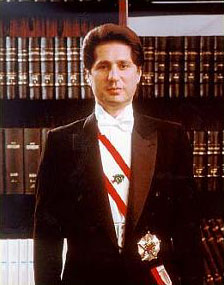




KATAEB - PHALANGISTS PARTY

TODAY:
BEIRUT: Former President Amin Gemayel will continue as leader of the Kataeb (Phalange) Party after winning the position uncontested Wednesday.
“President Amin Gemayel won the party’s leadership uncontested,” said a statement issued by the party. The statement also said attorney Shaker Aoun will stay on as first vice president while Sejaan Qazzi came in as second vice president.
On Aug. 7, Kataeb will hold a meeting at its headquarters in Saifi, Beirut, where it will elect 16 politburo members, five advisors and four members of the Higher Committee for Financial Control.
Read more: http://www.dailystar.com.lb/News/Politics/2011/Aug-03/Amin-Gemayel-to-remain-at-helm-of-Kataeb-party.ashx#ixzz1U75SGwss
(The Daily Star :: Lebanon News :: http://www.dailystar.com.lb)
______________________________________________________________________________________
Kataeb has five (5) MP in the house of representatives.
Amine Gemayel
President of Lebanon
In office
23 September 1982 – 22 September 1988
Preceded by Elias Sarkis
Succeeded by Selim Hoss
Personal details
Born January 22, 1942(1942-01-22)
Bikfaya, Lebanon
Political party Kataeb Party
Religion Maronite Catholic
Amine Pierre Gemayel (born 22 January 1942) was President of Lebanon from 1982 to 1988 and is the leader of Kataeb Party.
Born in the Lebanese village of Bikfaya, Amine Gemayel is the son of Pierre Gemayel, founder of the Kataeb Party. Gemayel was elected to the presidency by the National Assembly on 21 September 1982, in place of his brother Bachir Gemayel who had been elected the previous month but had been assassinated before taking office.
After obtaining a law degree in 1965 from the St. Joseph University in Beirut, Amine Gemayel concentrated on building up his family's newspaper business.In a 1969 by-election, he was elected to succeed his deceased uncle, Maurice Gemayel, as a member of the National Assembly; he defeated Fuad Lahoud by a margin of 54% to 41%. In 1972, in the last election to be held for 20 years, he was reelected by a large margin.[citation needed]
While his younger brother Bashir was regarded as a political radical, espousing the expulsion of Palestinian guerrillas from Lebanese soil and a radical overhaul of the political system, and hinting at a possible peace settlement with Israel, Amine Gemayel was considered more moderate.Always a consensus politician, he avoided, at least in his pre-presidential years, alienating Muslim politicians as his brother had done.[citation needed] When Bashir Gemayel was assassinated, therefore, Amine was regarded as a natural choice to bring together both the supporters of his slain brother, and his Muslim opponents.
The Gemayel presidency, 1982-1988Amin never promised the Israelis anything in order to be elected president, but he promised that he would follow the path of his brother Bashir whatever that path was. Therefore, once elected, Amin refused to meet any Israeli official. With foreign armies occupying two-thirds of the country (Syria in the north and east, Israel in the south), and private armies independent of government control occupying most of the rest, Gemayel's government lacked any real power. His efforts to reach a peace settlement with Israel were stymied by Syria and by Muslim politicians at home. His government found itself largely unable to collect income tax, as warlords controlling the ports and major cities pocketed the tax take themselves.Many criticized Gemayel for not moving decisively enough to assert the authority of the government, but others have pointed out that with most of the country under foreign occupation, there was little that he could do.He managed to keep a semblance of constitutional order. At one point, he was offered $30 million by Rafik Hariri if Gemayel appointed him Prime Minister. Gemayel refused the offer, and many years later Gemayel narrated the details on a live televised interview.Source: Interview with Maguy Farah on MTV c.1998.
Amin Gemayel's Inauguration, Beirut 1982This order began to unravel in 1988. Gemayel, whose term was due to end on 23 September, was constitutionally barred from reelection. Amine Gemayel opposed Dany Chamoun for the presidential elections, a man known for his strong anti-Syrian views, and the son of former president Camille Chamoun, or General Michel Aoun, the commander of the army. Chamoun and Aoun were both unacceptable to Syria and to Muslim politicians in Lebanon. A constitutional crisis developed. Fifteen minutes before the expiry of his term, Gemayel appointed Aoun to the post of Prime Minister, who takes on the role of Acting President if the presidency is vacant. He did so to preserve the tradition that the president, and by implication anyone acting in that role, should be a Maronite Christian[citation needed], thereby going against the tradition of reserving the premiership for a Sunni Muslim. Muslim politicians and warlords refused to accept the Aoun government, instead recognizing a rival government of Selim al-Hoss, whom Gemayel had dismissed in favour of Aoun.
Post-presidential yearsHoping that his absence would help to heal the divisions of Lebanon, Gemayel went into exile for the next twelve years, living variously in Switzerland, France, and the United States, where he lectured at Harvard University's Center for International Affairs (1988–1989) and at the University of Maryland, College Park. In 2000, however, he returned to Lebanon and began to organize the opposition to the government of President Émile Lahoud, whom he regarded as a Syrian puppet. Unable to regain control of the then pro-Syrian dominated official Kataeb Party, he founded a new party, Al qaida al Kataebiya, which claimed to be the true successor to the old Kataeb Party founded by his father.[citation needed] He also joined the Qornet Chehwan Gathering, a group of anti-government politicians (only Christian) leading numerous different political parties.
In 2003, Amine Gemayel attempted to act as an intermediary between U.S. President George W. Bush and the Iraqi dictator, Saddam Hussein. Although his efforts to forestall the ensuing Iraq War were not successful, they fuelled speculation that he might be a candidate for Secretary General of the United Nations when Kofi Annan's term expired.[citation needed]
After the Cedar Revolution the Kataeb factions were united under the leadership of Gemayel. In the August 2007, after Gemayel's son Pierre was assassinated, by-elections in the Metn region were held, and Amine ran for his late son's seat. Amine lost by a small margin to an unknown candidate presented by Michel Aoun as a member of the Free Patriotic Movement.